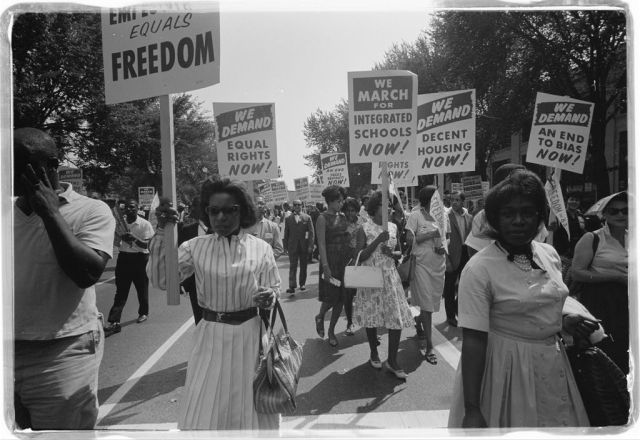
A procession of African-Americans carrying signs for equal rights, integrated schools, decent housing, and an end to bias on August 28, 1963. Photo courtesy U.S. Library of Congress
Tomorrow is the 50th anniversary of the 1963 march on Washington in the U.S. This march galvanized the country around the issue of civil rights and made the Rev. Martin Luther King Jr. into a national icon. Fifty years later, it stands as an unprecedented display of ecumenical cooperation by bringing together Catholic, Jewish and Protestant leaders. The Religion News Service put together an outstanding site where they asked participants to reflect on their lasting memories of the march and how it shaped their faith. I encourage you to read it as the stories are very moving.
Also, I want to briefly mention another Civil Rights event from 1963, Dr. King’s Letter From a Birmingham Jail. I will have a more detailed reflection on this during Martin Luther King Day in the U.S. next January, but I want to quote one of the best lines from that letter which highlights Christian moral law:
[T]here are two types of laws: there are just laws, and there are unjust laws. I would agree with St. Augustine that “An unjust law is no law at all.” Now, what is the difference between the two? How does one determine when a law is just or unjust? A just law is a man-made code that squares with the moral law, or the law of God. An unjust law is a code that is out of harmony with the moral law. To put it in the terms of St. Thomas Aquinas, an unjust law is a human law that is not rooted in eternal and natural law. Any law that uplifts human personality is just. Any law that degrades human personality is unjust. All segregation statutes are unjust because segregation distorts the soul and damages the personality. It gives the segregator a false sense of superiority and the segregated a false sense of inferiority. To use the words of Martin Buber, the great Jewish philosopher, segregation substitutes an “I – it” relationship for the “I – thou” relationship and ends up relegating persons to the status of things. So segregation is not only politically, economically, and sociologically unsound, but it is morally wrong and sinful. Paul Tillich has said that sin is separation. Isn’t segregation an existential expression of man’s tragic separation, an expression of his awful estrangement, his terrible sinfulness?”
On this anniversary, let us reflect on laws are currently in effect and daily actions we do (especially the legal ones) that change the I-though relationship into an I-it relationship.

I’ve read quite a number of posts this morning on the topic of phenotypic separations and stereotypes; yours is one of the better ones. It grieves me that we have been so focused on objectifying people, either as individuals or groups, that as a society we have forgotten how to love each individual neighbor. We’re working on that at our house. Peace be with you -Kelly
Kelly, thank you. I agree that one of the problems we have in a consumer society as that we tend to trend people as objects rather than people, both directly by treating them as objects for our consumer or sexual desires or indirectly through our lack of awareness of how all of our interactions affect others.
Peace,
W. Ockham
MLK is my hero. Always has been, always will be. Thanks for your reflections on the matter and for putting up that famous letter. Good stuff. Peace, Ik
Thanks Erik. Martin Luther King, Jr. is one of my heroes also. My mother was pregnant with me when both Martin Luther King, Jr. and Robert F. Kennedy were assassinated, both of whom my parents admired very much. Those events left deep impressions on my parents and they tried to pass on those ideals and faith to me (with mixed success through no fault of my parents :-).
I was born on April 4, two years to the day that MLK was killed. The impression is shared by everyone who lived through it and lives now, as it could be not other way. Peace, Ik
It is inspiring to read the interviews with those who participated in the march. I also appreciate reading the portion of Dr. King’s letter about moral law. That is very insightful and draws on several resources which have a great deal of credibility. We must never treat individuals as things. Each person is a child of Creator God. Thank you for this post.
Lynda, thank you. I thought the interviews were very inspiring as well. I find Martin Luther King, Jr. a very interesting person. He was brilliant in how he marshaled the intellectual and moral resources of Christianity (which was then still an integral part of the American culture; people can argue about whether it is today) to advance civil rights in a nonviolent manner. He is also very enigmatic in how while at the same time he was using Christian standards for the U.S. and showing how the country was falling fall short, in his personal life he sometimes fell short of those high standards also. Somehow I find that oddly appealing in that it makes him seem more authentically human. Perhaps that it is why I am also drawn to some of the colorful saints of the early Church (e.g. St. Paul, St. Peter, St. Augustine) who were all too human but heard and followed the voice of God.